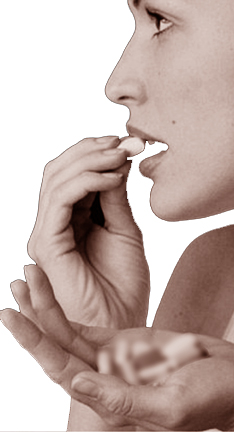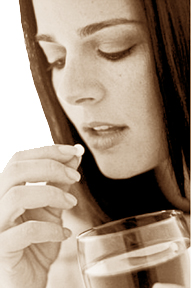One Paracetamol too many
Everybody's go-to analgesic the main pharmaceutical
poisoning agent:
by Carol Aloysius
|

Dr. Waruna Gunathilake |
A
sharp rise in pharmaceutical poisoning, with Paracetamol
leading the list of the poisoning agents used, has raised
serious concerns among medical authorities. New studies
reveal stress and depression arising from social issues as
contributory factors to this dangerous trend, further
compounded by the media, the ready availability of non
prescription over the counter drugs, and distribution in
bulk form. Underscoring this fact, research studies by the
Poisons Information Unit of the National Hospital Sri Lanka
(NHSL) recently revealed that 99% of the patients admitted
to the NHSL for pharmaceutical from January to April 2015,
were for abuse or overuse of Paracetamol poisoning.
Incidentally, pharmaceutical poisoning accounts for 47
percent of patients admitted to the National Hospital. What
is the reason for this growing trend? Who are those at risk?
Who is to blame? How can this dangerous development be
stopped? Dr. Waruna Gunathilake, Head of the National
Poisons Information Unit responds.
|
Excerpts...
Q: Medicinal drug overuse is now an increasing trend. What has
been the increase in the past 5 to 10 years? Is it only happening in Sri
Lanka or is it a global trend?
A: It is a global trend and Sri Lanka is following the same
trend.
|

Pic courtesy: Getty images |
Q: Why is this happening? What causes an apparently healthy
person to suddenly take an overdose of Paracetamol? Who are those most
at risk?
A: Since many factors are involved in this issue, let me
discuss them according to the two groups where its usage peaks the most
- those between 19 - 40 years and adolescents - from 14-19 years.
In the former group, the causes stem mainly from frustration, change
of employment, depression, stress due to their work pressure, and the
ingrained habit of taking Paracetamol for the slightest ailment from
their childhood.
The vast majority (99%) of this group incidentally swallows an
overdose of the drug deliberately.
In the case of adolescents, many are driven to take this drug because
of their impulsive behaviour and inability to control their feelings, a
common trait among young persons.
Q: What prompts this irrational behaviour?
A. Broken love affairs, failure at exams, especially at the
A/L exam, inability to meet their parents' expectations, broken family
units.
The social fabric has changed radically with divorces reaching a new
high even in our conservative society. Living in an increasingly
competitive society, young adolescents who are unable to cope with such
pressures do the next easiest thing by drowning themselves in
Paracetamol, because it is so readily available.
Q: Instances of overuse of prescribed drugs for those with
chronic illnesses e.g. diabetes, hypertension and heart problems, is
also on the rise. Your comments?
A: The most vulnerable group are the elderly who are most at
risk of these diseases. Most of them overdose themselves accidentally.
Storing their drugs in ill ventilated places where they cannot see the
drugs they are taking properly, could lead to an overdose. Or again due
to poor storage, they could accidentally take the wrong drugs,
especially if they are suffering from more than just one chronic
disease. This could lead to them ingesting a mixed number of drugs which
could have a multiple dangerous effect on their health. Further, if they
have a month's supply of say Paracetamol, which is given to them by some
state hospitals, they could overdose themselves with this drug for a
headache for some trivial reason, even though it has been prescribed for
a specific cause. Hence it is important that elderly persons, especially
those with poor memory and poor eye sight, only take their drugs under
supervision of another family member.
|
How to prevent
Paracetamol poisoning
 Pharmaceutical
poisoning is the most common and preventable type of
poisoning.There are many ways you can end this threat,
particularly poisoning from Paracetamol, to human life. They
are: Pharmaceutical
poisoning is the most common and preventable type of
poisoning.There are many ways you can end this threat,
particularly poisoning from Paracetamol, to human life. They
are:
* Restricting the sale of
all over the counter drugs and selling them in blister packs
instead of in bulk. This is done in European countries where
patients are given only packs of 1-12 tablets each in a
limited form. So if they want to have 100 tablets they will
have to buy ten packs. In our country, even hospitals
distribute them in bulk form and you can buy any amount of
tablets even in loose form in a private drug store
* Reduce the number of
brands under which Paracetamol is sold, so patients don't
keep changing the brands after each visit to their doctor.
* Have a colour code for
each commonly used drug. Have separate boxes with
compartments for each of the seven days of the week, so that
elderly patients won’t mix up their tablets. or take an
overdose.
* See that the tablets are
stored properly. Some drugs have to be in a dark colour
because they have to be protected from sunlight. Avoid
putting cotton inside the bottles as cotton absorbs moisture
and decays tablets like TNT used for potential heart
patients.
* See that the tablets are
well sealed. Check their expiry dates.
* Make sure each container
is dry and clean.
* Since Paracetamol
poisoning is so common today, we suggest that attention be
given by the authorities to introduce some proper
regulations with regard to its distribution especially in
bulk form.
* Unethical advertising of
this product must stop. The media, whether print or
electronic is to blame for popularising Paracetamol. Take
the advertisement that says “Menstrual pains? Take a
Paracetamol”? Or a Three Wheeler saying , “I'm ready to
start my day now that I have taken a Paracetamol.” All this
is misleading information. But it creates an impression on
impressionable minds, especially young persons. |
Q: What are the health impacts on elderly persons who overuse
their drugs?
A: Old age drug toxicity is more serious because their bodies
are not so resilient to fight back, as the various ailments they are
suffering from has undermined and compromised their health system. If
they are malnourished as well, they will be unable to fight these
adverse effects, some of which could even be fatal. An overdose of a
diabetic drug could lead to a sudden lowering of the sugar levels
resulting in the patient going into a coma. Blood pressure lowering
tablets can also be dangerous and the patient could collapse.
Q: What about psychotic drugs? What is the reason for
overusing them?
A: These are prescribed drugs. However, if a person who goes
into depression he may take an overdose as he is not thinking clearly.
Similarly someone with an incurable disease may take an overdose
deliberately to end his life. But such cases are rare.
Q: What is the treatment now given to patients admitted to the
NHSL for pharmaceutical poisoning?
A. Generally we administer two types of antidotes - Nocetyl
Cystine and Methonin - to counter diagnose the side effects of such
overuse. This treatment and the management of in patients is very costly
and is a huge drain on the health budget
Q: Can children suffer from pharmaceutical overdose poisoning?
A: Yes. If they accidentally swallow drugs prescribed for
diabetes or hypertension, which has been stored within their reach.
Q: Parents also dose their children with Paracetamol for the
slightest fever. Your comments?
A: They could suffer from the effects of a supra therapeutic
dose. As you say, most mothers who want to bring down fever in their
children quickly dose them with Paracetamol, without a doctor's advice.
If the fever continues, they go 'doctor shopping' with each doctor
giving them a different brand of Paracetamol.
The result is the child receives a supra therapeutic dose which can
lead to liver failure. This is common in children under 12 years.
Q: Since overuse of drugs leads to so many adverse effects,
what is your opinion on alternative methods of relieving stress, pain
and depression which don't require any drugs... non-conventional methods
such as acupuncture, touch therapy, oil massage, heat treatment,
electropathy, ice packs which are now becoming quite popular?
A: There is nothing wrong with using these methods as long as
the physician or therapist in charge knows you are already taking drugs
for certain ailments.
Some of the reports we have received seem to show they have had
positive results. Certainly they are better than popping a Paracetamol
into your mouth for a headache or pain! If however Paracetamol is
recommended by a physician for certain conditions such as severe
arthritis, you can take it but only according to the number prescribed. |

